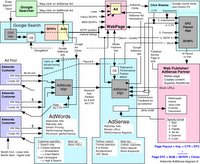You and I both know that some of the most fascinating and creative code comes from behind closed doors of Google, Inc. Smart Pricing is no different. Automatically adjusting the cost of a keyword-targeted content click, you gain less when data shows that a click from a content page is less likely to convert to a sale.
Recently, while trying to convince a former AdWords account to return from Yahoo's Publisher Network, it was reported that a Google team member gave insight to how the program may really work.
- Smart Pricing affect your entire AdSense account, not just one page.
- This means one poorly converting site can impact your whole account.
- Smart Pricing is re-evaluated each week. You can improve your numbers in as little as a week by removing low converting AdSense blocks.
- Smart Pricing is tracked with a 30 day cookie.
- Smart Pricing affects both text and image ads.
- Publishers earn less because the advertiser pays less than their minimum bid.
 And really, how can you tell which are low converters? Quite possibly the lower converters are simply lower earning niches. If you dropped them, you could really foul things up.
And really, how can you tell which are low converters? Quite possibly the lower converters are simply lower earning niches. If you dropped them, you could really foul things up.Here's what I thought when I learned this: what about swapping Yahoo Publisher Network ads for my AdSense ads on the lower converting sites?
Well, even before I had the chance to plug in code, Google sent out this information in an attempt to clarify the stories floating around about "Smart Pricing". Read on.
The facts about smart pricing
We've noticed a lot of talk recently about the phenomenon commonly referred to as 'smart pricing'. There are some misconceptions out there about this, so we wanted to provide a few facts about smart pricing and how to ensure you're maximizing your revenue.1. Many factors determine the price of an ad
More than conversion rate goes into determining the price of an ad: the advertiser's bid, the quality of the ad, the other ads competing for the space, the start or end of an ad campaign, and other advertiser fluctuations.
2. Clickthrough rate doesn't affect advertiser return on investment (ROI)
The percentage of clicks that convert for an advertiser is the most important factor in an advertiser's ROI, so it's not only possible, but common, to have a low CTR and a high advertiser conversion rate. It's also possible to have a high CTR and a low conversion rate. Don't remove the AdSense code from your site just because it has a lower CTR - it may be one of your best converting sites.
3. Google doesn't make money from 'smart pricing'
In fact, we make less money, since the cost to advertisers is reduced in order to provide a strong ROI. Ultimately, this leads to higher payouts for publishers by drawing a larger pool of advertisers and rewarding publishers who create high quality sites.
4. Remember the old chestnut: "Content is King"
The best way to ensure you benefit from AdSense is to create compelling content for interested users. This also means driving targeted traffic to your site -- advertisers don't gain as much ROI when paying for generic clicks as they do for quality clicks that come from interest in your content. Good content usually equals a good experience for user plus advertiser, which can be much more valuable than CTR.
Keep in mind that like most Google technology, our system for calculating advertiser pricing gets updated regularly. We're constantly improving our ad products to benefit both the publisher and advertiser communities; what benefits one side ultimately benefits the other.
Well, even still, it is tempting to experiment. What are you going to do with this information?
No comments:
Post a Comment